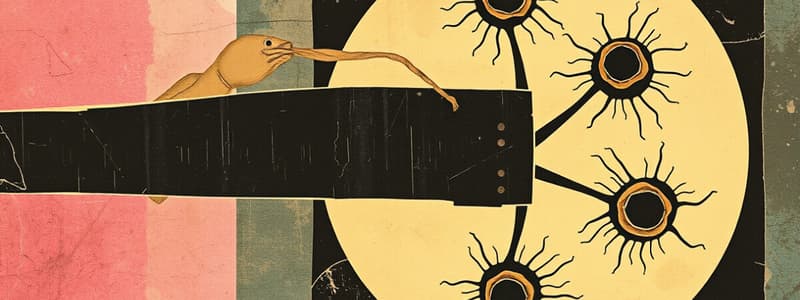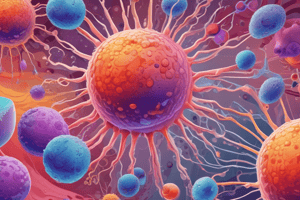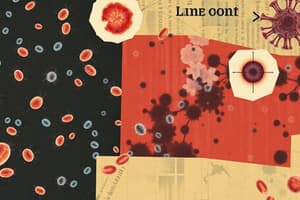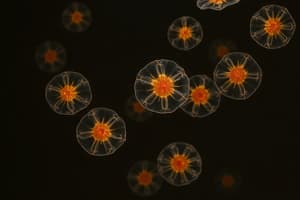Podcast
Questions and Answers
Which leukocytes are primarily responsible for antigen presentation?
Which leukocytes are primarily responsible for antigen presentation?
- B cells, natural killer cells, and macrophages
- Dendritic cells, memory cells, and T cells
- Macrophages, dendritic cells, and neutrophils (correct)
- T cells, macrophages, and neutrophils
Where do T cells originate?
Where do T cells originate?
- Spleen
- Blood
- Bone marrow (correct)
- Thymus
What is the primary function of B cells in the adaptive immune response?
What is the primary function of B cells in the adaptive immune response?
- Killing pathogens
- Activating T cells
- Producing antibodies and memory cells (correct)
- Phagocytizing foreign pathogens
During their maturation, T cells undergo which process in the thymus?
During their maturation, T cells undergo which process in the thymus?
Which statement correctly describes the relationship between T-helper cells and B cells?
Which statement correctly describes the relationship between T-helper cells and B cells?
What occurs to immature T-cells after they leave the bone marrow?
What occurs to immature T-cells after they leave the bone marrow?
Where do mature T cells reside after leaving the thymus?
Where do mature T cells reside after leaving the thymus?
Neutrophils are considered antigen presenting cells to a lesser extent than which of the following?
Neutrophils are considered antigen presenting cells to a lesser extent than which of the following?
What is primarily activated by antigen presenting cells?
What is primarily activated by antigen presenting cells?
What type of immunity are T lymphocytes primarily associated with?
What type of immunity are T lymphocytes primarily associated with?
What is the primary function of cytotoxic T-cells (TC cells) in the immune response?
What is the primary function of cytotoxic T-cells (TC cells) in the immune response?
During central tolerance, what happens to T-cells and B-cells that react with self-antigens?
During central tolerance, what happens to T-cells and B-cells that react with self-antigens?
Which step in the mechanism of TC cells involves the production of perforin?
Which step in the mechanism of TC cells involves the production of perforin?
What role do TH cells play in the activation of B cells?
What role do TH cells play in the activation of B cells?
What is the main purpose of B-cell proliferation during a humoral immune response?
What is the main purpose of B-cell proliferation during a humoral immune response?
What is the function of granzyme B in the mechanism of cytotoxic T cells?
What is the function of granzyme B in the mechanism of cytotoxic T cells?
Which type of immunity is primarily mediated by antibodies in response to a pathogen?
Which type of immunity is primarily mediated by antibodies in response to a pathogen?
Which component is crucial for the establishment of immunological memory during a secondary immune response?
Which component is crucial for the establishment of immunological memory during a secondary immune response?
What is the role of regulatory T cells (TR cells) in the immune response?
What is the role of regulatory T cells (TR cells) in the immune response?
What happens when B cells differentiate into plasma cells?
What happens when B cells differentiate into plasma cells?
Flashcards are hidden until you start studying
Study Notes
Activation of the Adaptive Immune Response
- Antigen Presenting Cells (APCs) include macrophages, dendritic cells, and neutrophils, crucial for activating the adaptive immune response.
- APCs phagocytize foreign pathogens and present their antigens to invoke an immune reaction.
Lymphocytes
- Lymphocytes are white blood cells found in blood and the lymphatic system, primarily consisting of two types: T cells and B cells.
- T cells kill pathogens and activate B cells; they are formed in the bone marrow and mature in the thymus.
- B cells produce antibodies and form memory cells, originating and maturing in the bone marrow.
T Lymphocytes and Cell-Mediated Immunity
- T cells originate in the bone marrow and mature in the thymus where they undergo clonal deletion.
- Mature T cells circulate in the blood and lymphatic tissues; clonal deletion ensures self-tolerance by eliminating cells that react to self-antigens.
- Central tolerance occurs during maturation; peripheral tolerance refers to clonal deletion of immature cells responding to self-antigens.
Steps of T-Cell Action
- Neutrophils and macrophages phagocytose pathogens and present antigens to T-helper cells (TH cells).
- Activation of TH cells leads to stimulation of cytotoxic T cells (TC), memory T cells, and B cells; they produce cytokines to enhance immune response.
- TC cells directly kill infected cells, while TM cells provide long-term immunity.
- Regulatory T cells (TR) prevent autoimmunity by regulating the immune response.
- B cells synthesize antibodies targeted against specific pathogens.
Mechanism of Cytotoxic T Cells
- TC cells induce apoptosis in virus-infected cells through several mechanisms.
- TC cells bind to infected cells via MHC molecules, producing perforins that create pores in target cell membranes.
- Granzyme enzymes enter through these pores; granzyme A poisons the cell, and granzyme B destroys it.
- Apoptosis is initiated by the binding of the TC cell's Fas ligand to the Fas receptor on the target cell.
- Interferons are released to inhibit viral replication and enhance the immune response in neighboring cells.
- Antibodies act on released viruses during and after the apoptotic event, opsonizing them to prevent further infection.
B-Cells and Humoral Immunity
- Each B cell is specific to a unique antigen; TH cells activate these specific B cells.
- Activated B cells undergo clonal expansion, rapidly proliferating to fight the infection.
- During clonal expansion, B cells differentiate into plasma cells or memory B cells.
- Plasma B cells produce antibodies during the primary immune response; they are short-lived.
- Memory B cells provide rapid antibody production during secondary infections, underpinning immunological memory, which facilitates faster and more effective responses upon re-exposure to the same pathogen.
- Humoral immunity relies on antibodies found in bloodstream and lymphatic fluid, central to the body’s defense mechanism.
Studying That Suits You
Use AI to generate personalized quizzes and flashcards to suit your learning preferences.



